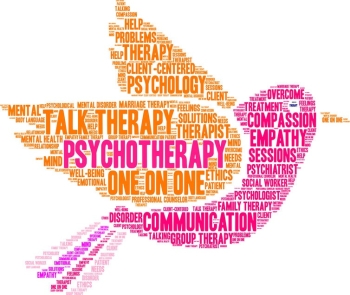
Psychotherapy vs Counseling: What’s the difference?
You decide to find a therapist, and as you start searching the web, you probably see many different names, different titles of their profession and many different types of practice: Psychotherapy, psychologist, counseling, and so on. With so many different labels being used, how do you know which one is best for you, and what are you supposed to call it?
While psychotherapy is the most commonly used term for this type of practice, there’s a variety of labels and terminology that can be used. For example, psychotherapy is often referred to as “talk therapy,” because it involves a client talking about different issues or behavioral problems with a trained professional, and therapy is just the abbreviated version of the term psychotherapy. While we can’t speak for all therapists, here at The Center for Growth, we tend to use terms like psychotherapy, counseling, and talk therapy interchangeably. Here’s a few important things to know about these terms:
Training
The one common thing about all of these terms is that it involves some level of formal training. A psychotherapist or counselor may be a health professional such as a social worker, licensed professional counselor, marriage and family therapist. Common credentials you will see for professionals calling themselves psychotherapists: PsyD (Doctorate of psychology), LPC (License professional counselor), LMFT (Licensed marriage and family therapist), LSW or LCSW (Licensed social worker or licensed clinical social worker). One thing to keep in mind though, education and training in psychology or psychiatry, or any of these areas, does not guarantee one’s experience or strong abilities as a psychotherapist. Not every psychotherapist will have the right approach for you, or even the right experience for you. For example, you may be seeing a seasoned psychotherapist initially for anxiety and it may be going very well, but you now have issues of grief to address. Your current therapist may not be strong in this specific area.
If you are looking for a specific level of training or education in your therapist, it is best to ask about their credentials, and not just assume based off their title of “Family Therapist” or “Couples Counselor.” Like we mentioned before, the terms can be used interchangeably, so not everyone uses them to imply a specific level of training, unless they specify a type of licensed credentials.
Psychotherapy, Counseling, Psychology, and Psychiatry: What’s What?
Typically, psychotherapy is viewed as a more long-term, a more in-depth approach to treatment, as compared to counseling, which can mean to some to be a more short-term problem solving approach, involving more advice-giving and education. Meaning, while differences between counseling and psychotherapy do exist, they can be used interchangeably and overall tend to have the same meaning and intent.
One important note to make about psychiatry: if your focus is more towards finding a professional who prescribes medications, such as antidepressants, mood stabilizers, etc., then you want a psychiatrist. Unless your psychiatrist also provides talk therapy as part of your treatment, it is recommended that if you are seeking medications to address mental health issues, that you also seek out psychotherapy as way to monitor and address the emotions and thoughts that may be contributing to your need for medications.
The title of psychologist can only be used by an individual who has completed their Doctorate of Philosophy(Ph.D.) or Doctorate of Psychology (Psy.D.) in clinical or counseling psychology. Most states require additional supervised experience in order to obtain licensure. While some psychologists are more research oriented and focus more on the use and practice of testing, many psychologists choose to practice psychotherapy.
Here at The Center for Growth our philosophy is that each client has different needs, which means each clients needs different styles and approaches based on many things: their personality, background, presenting issues, goals, etc. Some clients who walk in our door may need a more short-term, solution focused approach, while other clients’ goal may require more long term therapy with more exploration of thoughts and emotions rather than something more concrete. Our practice of psychotherapy is sometimes a combination of all styles, and other times based on the client’s needs it may be more talk-therapy, we work to fit with what’s best for the client. If you call our intake line, the therapist who answers the phone can help you decide who might be a good fit for you.
However, keep in mind you don’t just need to take a stranger’s word. That is why we strongly recommend doing your homework! Read up on your new or prospective therapist, whether it’s their bio on their website, or published journal articles. Even feel free to ask questions about their educational background and training/experience if you feel comfortable. At The Center for Growth we take training and professional growth extremely serious. It is essential in our training here to go through regular and consistent supervision involving the observing and processing of taped therapy sessions. This is the type of training that clients are unaware of unless they ask specific questions, or unless they are one of the clients who have given permission to have their session videotaped. Here at The Center for Growth we encourage you to read our bios and our tips on website, so you can get a better idea of how we work as a psychotherapist, and so you can decide with more of your own evidence: who/what is a better fit for you. Additionally, a good therapist will never take it personally if you opt to schedule several first sessions with different therapists so that you can see for yourself who is a good fit.






















